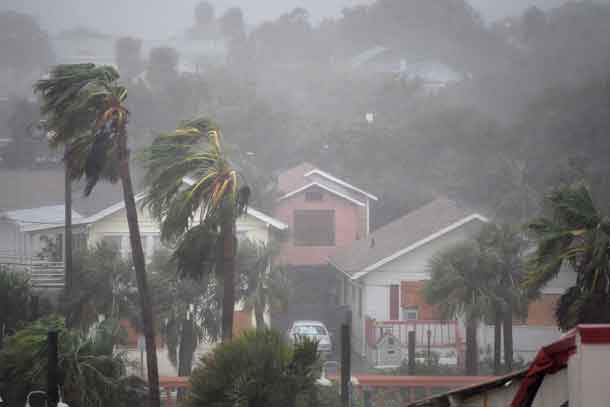

WASHINGTON (Reuters) – Hurricane Matthew, churning off the Florida coast, could present two major tests for the U.S. insurance industry – one for an unusual wind coverage market formed in recent years in Florida, and another for the troubled U.S. flood insurance programme.
In an era of rising seas, catastrophic damage from Matthew would likely revive questions about the extent to which American taxpayers should subsidize insurance for coastal communities, an issue that Washington has not adequately tackled, insurance industry experts said on Friday.
The first hurricane to threaten a direct hit on Florida since Hurricane Wilma in 2005, Matthew also raises questions about small, specialist insurers that have come to dominate the Florida homeowner market in the past decade.
“These smaller companies have a relatively short history and haven’t had the experience of dealing with claims activity from a large storm,” said Christopher Grimes, a director at Fitch Ratings.
Private U.S. insurers write policies covering wind damage from hurricanes, but generally will not cover water damage on their own. For that, they rely for support on the government’s National Flood Insurance Program.
Potential flooding from Matthew could pile billions of dollars in new claims onto the programme, which was more than $23 billion in debt before heavy floods in Louisiana this year. Another hit from Matthew, experts said, could force Congress to expand the programme’s borrowing authority yet again.
“They’ve paid billions more than they have already, and will probably pay another couple of billion here,” said J. Robert Hunter, a former U.S. flood insurance programme director. “But it really has the full faith and credit of the United States behind it. If they have to pay more claims, they’ll pay them.”
Under the programme, dozens of private insurers sell and service flood policies on the government’s behalf. The companies process claims, collect premiums and send the money to the Federal Emergency Management Agency (FEMA), which oversees the programme.
In recent years, FEMA has had to borrow heavily from the U.S. Treasury to cover flood losses. Efforts to fix the programme led in 2012 to reform legislation, but it raised premiums for many coastal homeowners. Two years later, Congress curtailed the reforms. Lawmakers have not substantively addressed the issue since then.
Estimates of damages from Matthew ranged from $25 billion to $30 billion. That would surpass U.S. natural disaster insurance losses for all of 2015, which insurer Munich Re <MUVGn.DE> estimated at more than $16 billion.
Weather forecasters still warned of destructive storm surge and waves on the coastline to North Carolina in coming days. But fears of extremely high losses from Matthew had abated by mid-Friday as the massive storm weakened overnight to a Category 3 hurricane and remained off the coast, for now.
That could spare a new breed of insurers in Florida from heavy financial damages. On the companies – Clearwater, Florida-based Heritage Insurance Holdings <HRTG.N> – predicted that insurers could absorb losses based on Matthew’s projected path.
Shares in Heritage were up 7.2 percent at $13.36 on the New York Stock Exchange. Share prices were also up in Florida insurers Universal Holdings <UVE.N>, HCI Group Inc <HCI.N>, Federated National <FNHC.O> and United Insurance Co <UIHC.O>.
FLORIDA’S MOVE TOWARD PRIVATIZATION
Fitch Ratings, the credit and risk analysis group, said on Friday that smaller insurers now constitute 60 percent of the homeowner market in Florida. In the absence of a big storm over several years, they have been profitable, but they are also relatively small and rely heavily on reinsurance.
“We’ll see if any of them fail as a result of this. But I have a feeling they won’t,” said Hunter, who is now director of insurance for the Consumer Federation of America, an activist group. “If they have good reinsurance, then being small and undercapitalized isn’t going to put them under.”
The federation predicted Matthew could generate up to 100,000 claims and more than $7.5 billion in damage, mostly from high winds rather than floods.
After Hurricane Andrew devastated South Florida in 1992 and left 65 people dead, Florida set up Citizens Property Insurance Corp in 2002 as a government-backed, non-profit insurer of last resort for Florida homeowners. It was meant to extend wind-damage and general property coverage to Floridians who could not get it elsewhere. It does not cover flood damage.
In 2004-2005, Florida was hit by several big storms and many large private insurers abandoned the state. Citizens became the state’s largest property insurer. But top, multiline insurers returned to Florida after 2010.
Concerned about taxpayers’ exposure through Citizens, the state moved to shrink it by pushing policy-holders onto the private market. Encouraged by the state, more than a dozen companies, including Heritage and Safepoint Insurance Co., formed to write policies for those leaving Citizens.
As a result of the emergence of these so-called “takeout” carriers – as in taking policies away from Citizens – the government-backed insurer now has a much smaller slice of the Florida market.
The new, smaller companies do not strictly follow the traditional insurance model of building up cash reserves to cover catastrophic events, but instead rely heavily on reinsurance coverage. These companies “are relatively untested by a large catastrophe event,” FitchRatings said.
“Loss experience from Matthew will provide insight into the underwriting expertise of the Florida specialist companies and their ability to service a significant amount of claims,” Fitch Ratings said in a statement.
By David Morgan
(Additional reporting by Richard Cowan)






